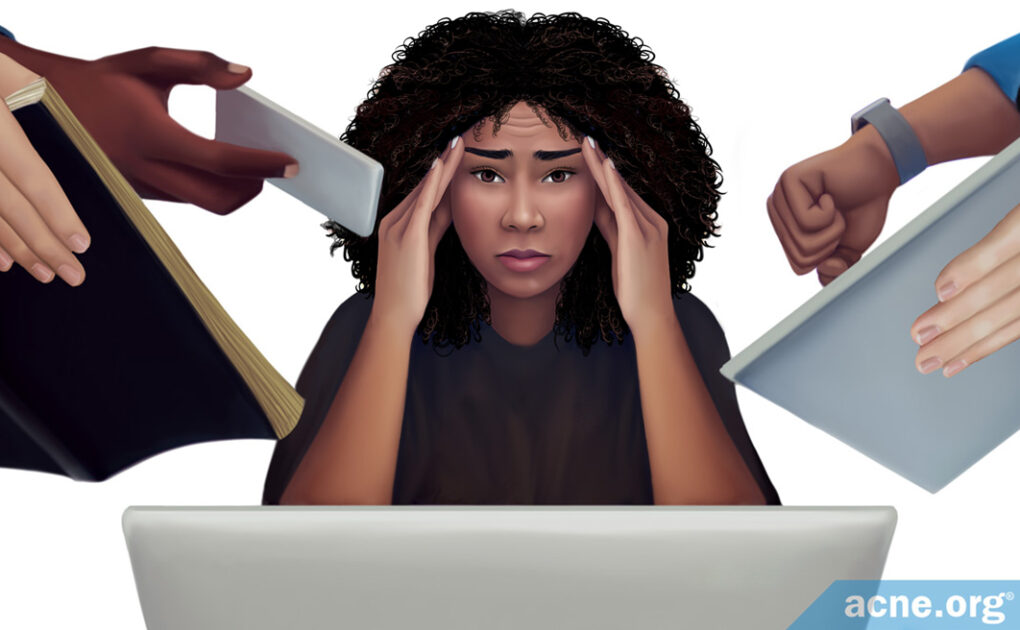Info on How Stress May Worsen Acne and Tips on How to Chill Out

The Essential Info
Stress may make acne worse through increased:
- Hormone levels
- Inflammation in the body
- Skin oil production (this requires further study)
This is particularly true in females but is also true in males.
Stress is defined as any undue emotional or physical strain. Examples include:
Emotional:
- Relationship problems
- Anxiety regarding an upcoming event
- Bullying
- Overwhelming workload
Physical:
- Lack of sleep
- Sedentary lifestyle
- Smoking/drugs
- Hectic lifestyle
- Overly demanding exercise/sports routine
What To Do About It
Worrying about stress is of course only going to make it worse. Exercise, deep breathing and/or meditation, and adequate rest can help.

The Science
Stress can wreak havoc on our bodies, including our skin, and can lead to more acne symptoms.
What Exactly Is Stress?
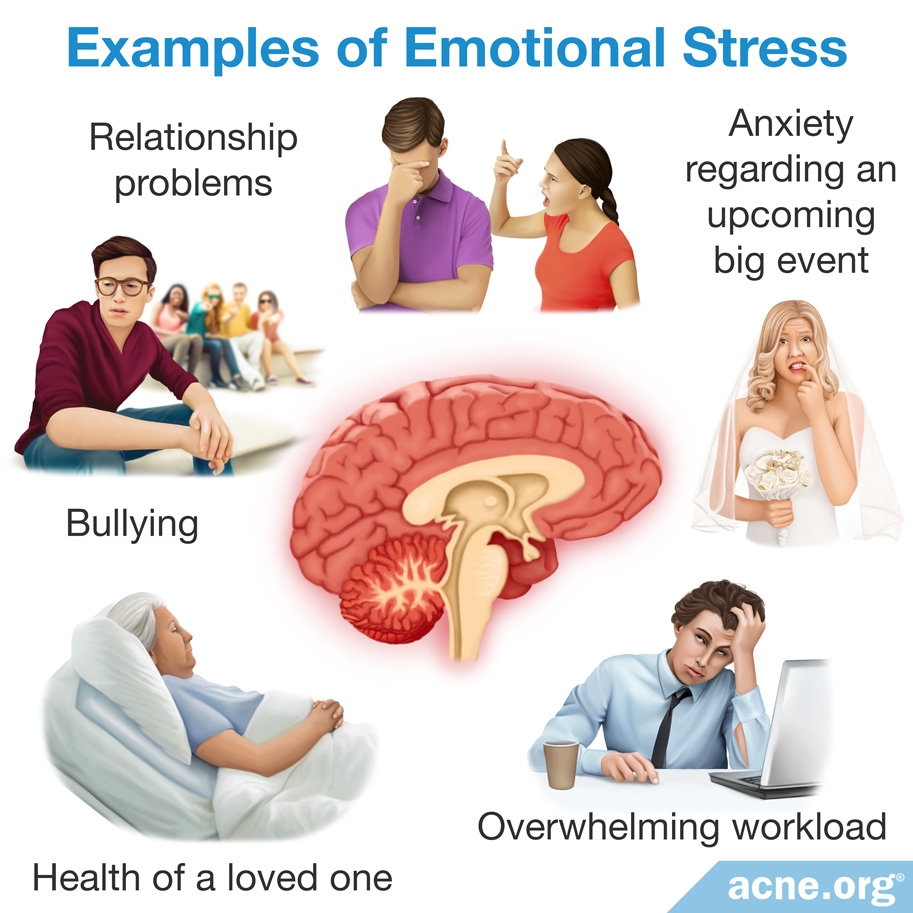
Stress is any undue emotional or physical strain.
It might be surprising that this definition includes physical strain. Many people view stress as just an emotional issue, but when we’re speaking about acne, it is best to include undue physical strain in our definition since both can come into play.
How Does Stress Affect Acne?
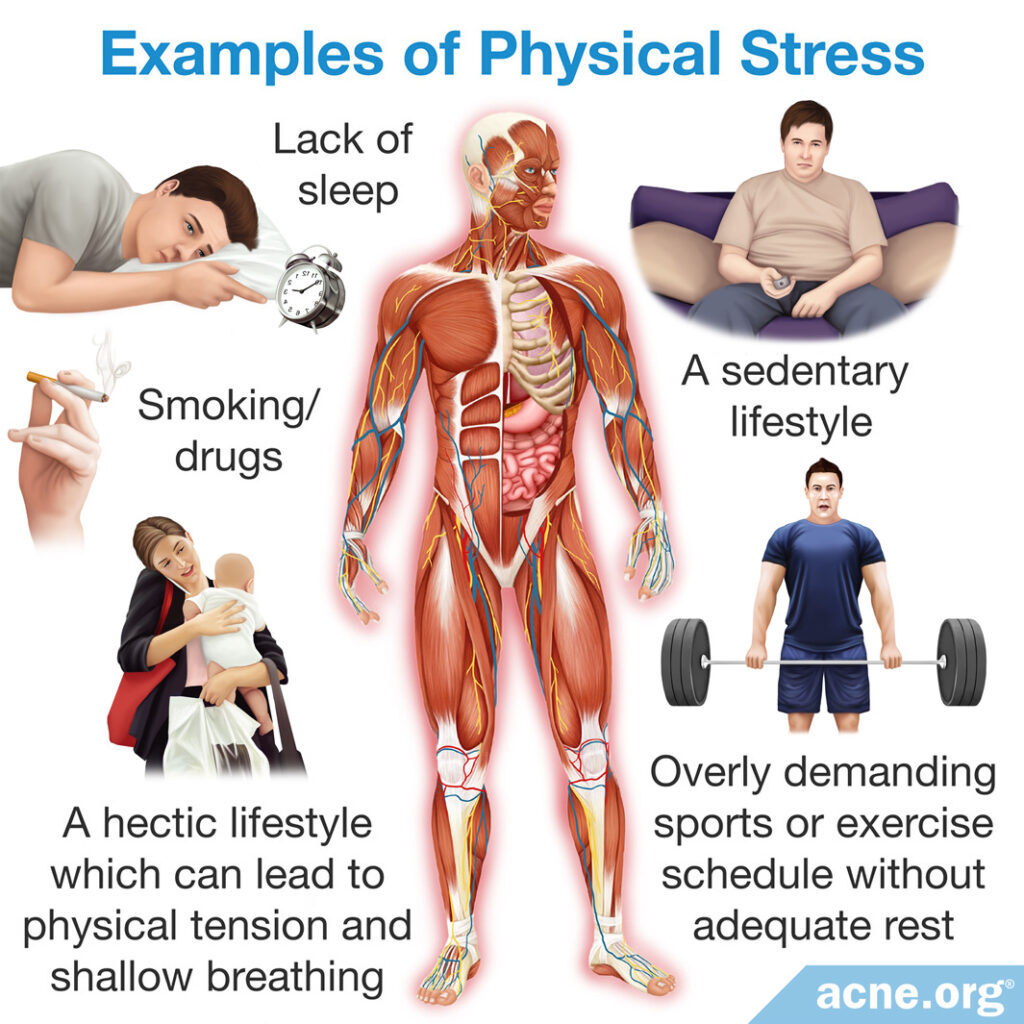
Research shows that stress is linked with an increase in acne. Stress can worsen acne in two ways:1-3
- Hormones: Androgens are male hormones that are present in both males and females. Higher androgen levels lead to more acne.
When we experience stress, glands that produce androgens, called adrenal glands, go into overdrive.
This is especially true in women, who produce a much larger percentage of their androgens in the adrenal glands. This may explain why stress seems to affect women more than men when it comes to acne.
- Inflammation: Stress causes an inflammatory response in the body. Acne is at its core an inflammatory disease, so anything that causes inflammation can make acne worse.2-4
Three studies have tried to link stress to acne, and while none of them are perfect studies, they do provide some evidence of what people tend to notice anecdotally—that when they are more stressed out, they tend to break out more.
The first study found that school-related stress tended to go hand-in-hand with more acne, especially for male students.5
The second study found that more stress seemed to trigger increased skin oil production, which would likely lead to more acne, but only in people who already had acne to begin with.6
The third study, which was the weakest because it was entirely based on data obtained from an online questionnaire, found that stress in medical school students tended to come with increased acne symptoms.7
Expand to read details of studies

In 2007, the journal Acta Dermato-Venereologica published a study looking at a possible link between stress and acne severity. The researchers examined 94 high school students during a time of high stress and during a time of low stress to see whether their acne was worse during high stress. The high-stress time was during exams, and the low-stress time was during summer vacation. At both times, the scientists measured the students’ skin oil (sebum) production, scored the severity of their acne, and asked the students to report their stress levels.
The researchers found that the students reported more stress during exam time and also tended to have more severe acne during this time. This was especially true for male students. However, the researchers did not see a difference in skin oil production between the high-stress and low-stress time.5
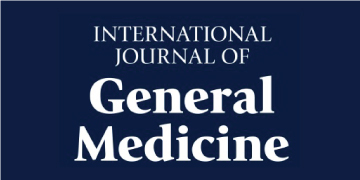
In 2021, the International Journal of General Medicine published another study looking at the possible link between stress levels and skin oil production. The study included 30 people with acne and 30 people without acne. To measure stress, the researchers asked the participants to complete a questionnaire containing 43 questions. Instead of measuring skin oil production directly, they measured the amount of a molecule called “substance P” in the blood. This molecule not only triggers the skin to produce more skin oil but also increases inflammation in the skin. Both of these effects should increase acne. In other words, while the researchers did not look directly at whether stress might cause more acne, they looked at an intermediate step that might explain how stress could theoretically trigger more acne.
Interestingly, the researchers found that higher stress tended to go hand-in-hand with more substance P in the blood for people with acne, but not for people without acne. In other words, for people with acne, more stress meant more substance P and therefore probably more skin oil, inflammation, and acne, but for people without acne, more stress made no difference to the amount of substance P.6 This suggests that the bodies of people with acne might respond differently to stress. However, more research is necessary to understand exactly what this means.
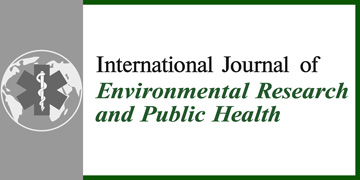
Finally, in 2022, the International Journal of Environmental Research and Public Health published another study on stress and acne. This study included 168 medical school students in Saudi Arabia. This was the weakest study of the three because the researchers did not examine the participants directly, but instead, asked the participants to complete an online questionnaire about their stress levels and acne symptoms. After analyzing the participants’ answers, the researchers came to the conclusion that school-related stress was linked to increased acne symptoms.7
These studies provide some preliminary evidence that more stress might lead to more acne. However, the relationship between acne and stress is not clear-cut. Other factors might be at play: for example, people’s eating habits might worsen during times of stress, which might in turn worsen acne. Moreover, scientists speculate whether some people might be more prone to stress-related acne flare-ups than others.
In addition, having acne can itself induce stress, so this can become a vicious cycle.8,9 Therefore, it is a good idea to learn some techniques for managing stress.
What Are Some Effective Tools to Handle Stress?
- Exercise: As long as you’re not overdoing it, exercise is far and away the best way to reduce emotional stress. We are first and foremost physical animals. Get your heart going and more oxygen will flow to your brain, resulting in a reduced stress response. Try to get your body moving at least three times a week for a good half hour or more.
- Take time each day to meditate or do deep breathing exercises: Even 8-15 minutes of quiet “connected” or “prayer” time per morning makes a huge difference for many people.
- Get a good night’s sleep: Helpful link: Sleep Foundation
References
- Zari, S. & Alrahmani, D. The association between stress and acne among female medical students in Jeddah, Saudi Arabia. Clin. Cosmet. Investig. Dermatol. 10, 503 – 506 (2017). https://www.ncbi.nlm.nih.gov/pubmed/29255370
- Zouboulis, C. C. & Bohm, M. Neuroendocrine regulation of sebocytes – a pathogenetic link between stress and acne. Exp. Dermatol. 13, 31-35 (2004). https://www.ncbi.nlm.nih.gov/pubmed/15507110
- Lee WJ, et al. Influence of substance-P on cultured sebocytes. Arch. Dermatol. Res. 300, 311-317 (2008). https://www.ncbi.nlm.nih.gov/pubmed/18427822
- Pondeljak, N. & Lugović-Mihić, L. Stress-induced interaction of skin immune cells, hormones, and neurotransmitters. Clin. Ther. 42, 757-770 (2020). https://pubmed.ncbi.nlm.nih.gov/32276734/
- Yosipovitch, G., Tang, M., Dawn, A. G., Chen, M., Goh, C. L., Huak, Y. & Seng, L. F. Study of psychological stress, sebum production and acne vulgaris in adolescents. Acta Derm. Venereol. 87, 135-139 (2007). https://pubmed.ncbi.nlm.nih.gov/17340019/
- Jusuf, N. K., Putra, I. B. & Sutrisno, A. R. Correlation between stress scale and serum substance P level in acne vulgaris. Int. J. Gen. Med. 14, 681-686 (2021). https://pubmed.ncbi.nlm.nih.gov/33688239/
- Aziz, F. & Khan, M. F. Association of academic stress, acne symptoms and other physical symptoms in medical students of King Khalid University. Int. J. Environ. Res. Public Health. 19, 8725 (2022). https://pubmed.ncbi.nlm.nih.gov/35886577/
- Maleki, A. & Khalid, N. Exploring the relationship between stress and acne: a medical student’s perspective. Clin. Cosmet. Investig. Dermatol. 11,173 – 174 (2018). https://www.ncbi.nlm.nih.gov/pubmed/29697695
- Misery, L., Wolkenstein, P., Amici, J. M. et al. Consequences of acne on stress, fatigue, sleep disorders and sexual activity: a population-based study. Acta Derm. Venereol. 95, 485 – 488 (2015). https://www.ncbi.nlm.nih.gov/pubmed/25365961
Further reading
- Purvis, D., Robinson, E., Merry, S. & Watson, P. Acne, anxiety, depression and suicide in teenagers: A cross-sectional survey of New Zealand secondary school students. J. Paediatr. Child Health. 42, 793-796 (2006). https://www.ncbi.nlm.nih.gov/pubmed/17096715
 Acne.org Products
Acne.org Products